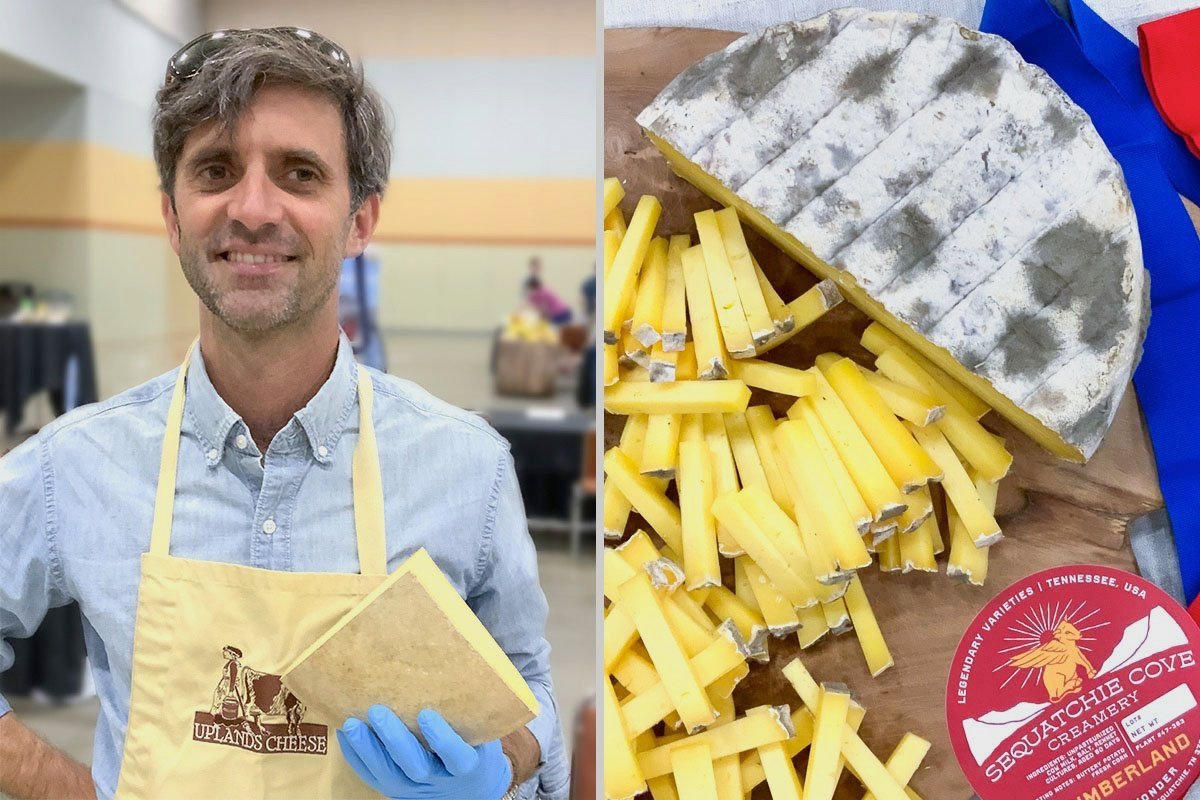As usual, the winners’ circle at the recent American Cheese Society awards included several repeat victors who almost always land ribbons. They’re just that good. A handful of new creameries won blue ribbons, but the top honors—the Best of Show and four runners-up—went to long-established producers. These five winners, from five states, had at least one common feature. “What struck me, standing on stage, was that it was all independent cheesemakers,” said Andy Hatch of Wisconsin’s Uplands Cheese (pictured above). In an industry that constantly grapples with the meaning of “artisan cheese,” it is indeed worth noting that the five winning wheels were all made by hand.
Best of Show: St. Malachi
Let’s start with the champion, the 2023 Best of Show: St. Malachi from the Farm at Doe Run in Pennsylvania. Olivia Haver, the farm’s head affineur (cheese ager), describes it as a blend of alpine and Gouda styles with a natural rind. Haver and her team make only a dozen 14-pound wheels at a time—that’s artisan, all right—from the milk of 20 cows that live outside all year. “We want our milk to taste like our land,” says Haver.
The winning wheel was about eight months old and good luck finding it. The minuscule output goes primarily to a handful of shops in Philadelphia and New York City. The creamery has no website and does not sell direct to consumers. Richard Hayne, a co-founder of Urban Outfitters, is Doe Run’s owner and he seems to have zero interest in capitalizing on the creamery’s astonishing track record. St. Malachi’s Best of Show finish almost obscured the fact that Doe Run won three other first-place ribbons, three second-place ribbons and a third-place ribbon. Eight ACS award-winning cheeses from a tiny creamery. That has to be some kind of record.
There was not a scrap of St. Malachi at the ACS conference where the awards were announced so I couldn’t refresh my taste memory. The image in this post is one I took at the 2017 ACS conference, when the cheese was first runner up to the Best of Show. I judged that category and I remember the cheese as dense, concentrated and butterscotchy, more Gouda-like than alpine. If you spot it, grab it.
Sequaatchie Cove’s Padgett Arnold
First runner up, in beauty-pageant parlance, was Sequatchie Cove Creamery’s Cumberland (top right), a raw cow’s milk wheel inspired by Tomme de Savoie and matured for two to four months. It has a handsome, mold-dusted natural rind and aromas of roasted nut and damp cave. Padgett Arnold, co-owner of the creamery with her husband, Nathan, describes it as having a “forest-floor quality.” Although Sequatchie Cove started as a farmstead producer, with milk from their own cows, the Arnolds now purchase their milk from others.
Demand for Cumberland is strong—it’s sold out through September—but the Arnolds don’t have the milk supply to scale up. It’s a conundrum familiar to a lot of small cheesemakers. “We are fighting for survival all the time,” says Padgett. “The only way we can survive is to get bigger.”
Blue-ribbon sheep cheese: Prairie Tomme
Three creameries tied for second runner up this year: Pleasant Ridge Reserve from Uplands Cheese (a three-time former Best of Show); Prairie Tomme, an aged sheep cheese from Missouri’s Green Dirt Farm; and Basket Molded Chevre from Pure Luck Dairy in Texas. I don’t think the Pure Luck cheeses leave Texas, but Pleasant Ridge Reserve is widely available at good cheese shops and Green Dirt Farm sells Prairie Tomme on its website. It’s not inexpensive but it is superb, a standout in the pitifully small niche of American aged sheep cheese, with a pronounced brown-butter aroma.
A few other notes about the recent ACS awards:
I predicted good showings for five relatively new American creameries. Only one of them, Face Rock Creamery, won ribbons (Mystic Cheese did not submit cheese for judging) but it won big, with three first-place finishes, including for its Clothbound Cheddar. What a great achievement for cheesemaker Brad Sinko, who is battling cancer.
Whiz kid: Avery Jones (center) with parents Reggie and Kellie Jones
Nineteen-year-old Avery Jones continued her winning streak with a blue ribbon for Sagittarius, a Gouda from a blend of sheep’s and cow’s milk. Jones stunned the cheese world in 2019 when, as a 16-year-old, she won a blue ribbon for Aries, an aged sheep wheel, which went on to place third overall. Jones’s Shooting Star Creamery in Paso Robles, California, is affiliated with her father’s Central Coast Creamery, but the recipes and methods are hers. In this year’s judging, the college junior outperformed her dad, who won second- and third-place ribbons but no firsts.
Blakesville Creamery Linedeline (left) and Shabby Shoe
Wisconsin’s new Blakesville Creamery, which I profiled recently in Planet Cheese, also cleaned up at the ACS judging, with three first-place ribbons (for Linedeline, Shabby Shoe and St. Germain) and a second-place finish for Sunny Ridge. Cheesemaker Veronica Pedraza continues to rack up acclaim for this well-capitalized farmstead goat dairy.
View the complete list of 2023 American Cheese Society award winners here.






